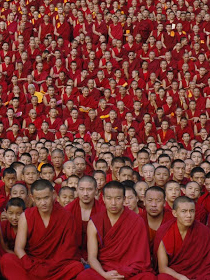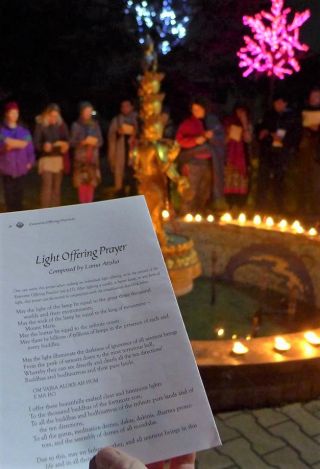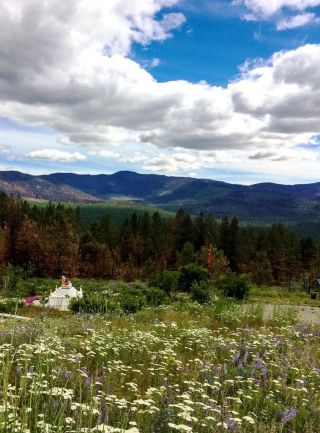- Home
- FPMT Homepage
Foundation for the Preservation of the Mahayana Tradition
The FPMT is an organization devoted to preserving and spreading Mahayana Buddhism worldwide by creating opportunities to listen, reflect, meditate, practice and actualize the unmistaken teachings of the Buddha and based on that experience spreading the Dharma to sentient beings. We provide integrated education through which people’s minds and hearts can be transformed into their highest potential for the benefit of others, inspired by an attitude of universal responsibility and service. We are committed to creating harmonious environments and helping all beings develop their full potential of infinite wisdom and compassion. Our organization is based on the Buddhist tradition of Lama Tsongkhapa of Tibet as taught to us by our founders Lama Thubten Yeshe and Lama Thubten Zopa Rinpoche.
- Willkommen
Die Stiftung zur Erhaltung der Mahayana Tradition (FPMT) ist eine Organisation, die sich weltweit für die Erhaltung und Verbreitung des Mahayana-Buddhismus einsetzt, indem sie Möglichkeiten schafft, den makellosen Lehren des Buddha zuzuhören, über sie zur reflektieren und zu meditieren und auf der Grundlage dieser Erfahrung das Dharma unter den Lebewesen zu verbreiten.
Wir bieten integrierte Schulungswege an, durch denen der Geist und das Herz der Menschen in ihr höchstes Potential verwandelt werden zum Wohl der anderen – inspiriert durch eine Haltung der universellen Verantwortung und dem Wunsch zu dienen. Wir haben uns verpflichtet, harmonische Umgebungen zu schaffen und allen Wesen zu helfen, ihr volles Potenzial unendlicher Weisheit und grenzenlosen Mitgefühls zu verwirklichen.
Unsere Organisation basiert auf der buddhistischen Tradition von Lama Tsongkhapa von Tibet, so wie sie uns von unseren Gründern Lama Thubten Yeshe und Lama Thubten Zopa Rinpoche gelehrt wird.
- Bienvenidos
La Fundación para la preservación de la tradición Mahayana (FPMT) es una organización que se dedica a preservar y difundir el budismo Mahayana en todo el mundo, creando oportunidades para escuchar, reflexionar, meditar, practicar y actualizar las enseñanzas inconfundibles de Buda y en base a esa experiencia difundir el Dharma a los seres.
Proporcionamos una educación integrada a través de la cual las mentes y los corazones de las personas se pueden transformar en su mayor potencial para el beneficio de los demás, inspirados por una actitud de responsabilidad y servicio universales. Estamos comprometidos a crear ambientes armoniosos y ayudar a todos los seres a desarrollar todo su potencial de infinita sabiduría y compasión.
Nuestra organización se basa en la tradición budista de Lama Tsongkhapa del Tíbet como nos lo enseñaron nuestros fundadores Lama Thubten Yeshe y Lama Zopa Rinpoche.
A continuación puede ver una lista de los centros y sus páginas web en su lengua preferida.
- Bienvenue
L’organisation de la FPMT a pour vocation la préservation et la diffusion du bouddhisme du mahayana dans le monde entier. Elle offre l’opportunité d’écouter, de réfléchir, de méditer, de pratiquer et de réaliser les enseignements excellents du Bouddha, pour ensuite transmettre le Dharma à tous les êtres. Nous proposons une formation intégrée grâce à laquelle le cœur et l’esprit de chacun peuvent accomplir leur potentiel le plus élevé pour le bien d’autrui, inspirés par le sens du service et une responsabilité universelle. Nous nous engageons à créer un environnement harmonieux et à aider tous les êtres à épanouir leur potentiel illimité de compassion et de sagesse. Notre organisation s’appuie sur la tradition guéloukpa de Lama Tsongkhapa du Tibet, telle qu’elle a été enseignée par nos fondateurs Lama Thoubtèn Yéshé et Lama Zopa Rinpoché.
Visitez le site de notre Editions Mahayana pour les traductions, conseils et nouvelles du Bureau international en français.
Voici une liste de centres et de leurs sites dans votre langue préférée
- Benvenuto
L’FPMT è un organizzazione il cui scopo è preservare e diffondere il Buddhismo Mahayana nel mondo, creando occasioni di ascolto, riflessione, meditazione e pratica dei perfetti insegnamenti del Buddha, al fine di attualizzare e diffondere il Dharma fra tutti gli esseri senzienti.
Offriamo un’educazione integrata, che può trasformare la mente e i cuori delle persone nel loro massimo potenziale, per il beneficio di tutti gli esseri, ispirati da un’attitudine di responsabilità universale e di servizio.
Il nostro obiettivo è quello di creare contesti armoniosi e aiutare tutti gli esseri a sviluppare in modo completo le proprie potenzialità di infinita saggezza e compassione.
La nostra organizzazione si basa sulla tradizione buddhista di Lama Tsongkhapa del Tibet, così come ci è stata insegnata dai nostri fondatori Lama Thubten Yeshe e Lama Zopa Rinpoche.
Di seguito potete trovare un elenco dei centri e dei loro siti nella lingua da voi prescelta.
- 欢迎 / 歡迎
简体中文
“护持大乘法脉基金会”( 英文简称:FPMT。全名:Foundation for the Preservation of the Mahayana Tradition) 是一个致力于护持和弘扬大乘佛法的国际佛教组织。我们提供听闻,思维,禅修,修行和实证佛陀无误教法的机会,以便让一切众生都能够享受佛法的指引和滋润。
我们全力创造和谐融洽的环境, 为人们提供解行并重的完整佛法教育,以便启发内在的环宇悲心及责任心,并开发内心所蕴藏的巨大潜能 — 无限的智慧与悲心 — 以便利益和服务一切有情。
FPMT的创办人是图腾耶喜喇嘛和喇嘛梭巴仁波切。我们所修习的是由两位上师所教导的,西藏喀巴大师的佛法传承。
繁體中文
護持大乘法脈基金會”( 英文簡稱:FPMT。全名:Found
ation for the Preservation of the Mahayana Tradition ) 是一個致力於護持和弘揚大乘佛法的國際佛教組織。我們提供聽聞, 思維,禪修,修行和實證佛陀無誤教法的機會,以便讓一切眾生都能 夠享受佛法的指引和滋潤。 我們全力創造和諧融洽的環境,
為人們提供解行並重的完整佛法教育,以便啟發內在的環宇悲心及責 任心,並開發內心所蘊藏的巨大潛能 — 無限的智慧與悲心 – – 以便利益和服務一切有情。 FPMT的創辦人是圖騰耶喜喇嘛和喇嘛梭巴仁波切。
我們所修習的是由兩位上師所教導的,西藏喀巴大師的佛法傳承。 察看道场信息:
- FPMT Homepage
- News/Media
-
- Study & Practice
-
-
- About FPMT Education Services
- Latest News
- Programs
- New to Buddhism?
- Buddhist Mind Science: Activating Your Potential
- Heart Advice for Death and Dying
- Discovering Buddhism
- Living in the Path
- Exploring Buddhism
- FPMT Basic Program
- FPMT Masters Program
- FPMT In-Depth Meditation Training
- Maitripa College
- Lotsawa Rinchen Zangpo Translator Program
- Universal Education for Compassion & Wisdom
- Online Learning Center
-
- Prayers & Practice Materials
- Overview of Prayers & Practices
- Full Catalogue of Prayers & Practice Materials
- Explore Popular Topics
- Benefiting Animals
- Chenrezig Resources
- Death & Dying Resources
- Lama Chopa (Guru Puja)
- Lama Zopa Rinpoche: Compendium of Precious Instructions
- Lama Zopa Rinpoche: Life Practice Advice
- Lama Zopa Rinpoche Practice Series
- Lamrim Resources
- Mantras
- Prayer Book Updates
- Purification Practices
- Sutras
- Thought Transformation (Lojong)
- Audio Materials
- Dharma Dates - Tibetan Calendar
- Translation Services
- Publishing Services
- Ways to Offer Support
- Prayers & Practice Materials
-
- Teachings and Advice
- Find Teachings and Advice
- Lama Zopa Rinpoche Advice Page
- Lama Zopa Rinpoche: Compendium of Precious Instructions
- Lama Zopa Rinpoche Video Teachings
- ༧སྐྱབས་རྗེ་བཟོད་པ་རིན་པོ་ཆེ་མཆོག་ནས་སྩལ་བའི་བཀའ་སློབ་བརྙན་འཕྲིན།
- Podcasts
- Lama Yeshe Wisdom Archive
- Buddhism FAQ
- Dharma for Young People
- Resources on Holy Objects
- Teachings and Advice
-
-
*If a menu item has a submenu clicking once will expand the menu clicking twice will open the page.
-
-
- Centers
-
- Teachers
-
- Projects
-
-
-
-
*If a menu item has a submenu clicking once will expand the menu clicking twice will open the page.
-
-
- FPMT
-
-
-
-
-
The mental pollution of misconceptions is far more dangerous than drugs. Wrong ideas and faulty practice get deeply rooted in your mind, build up during your life, and accompany your mind into the next one. That is much more dangerous than some physical substance.
Lama Thubten Yeshe
-
-
-
- Shop
-
-
-
The Foundation Store is FPMT’s online shop and features a vast selection of Buddhist study and practice materials written or recommended by our lineage gurus. These items include homestudy programs, prayers and practices in PDF or eBook format, materials for children, and other resources to support practitioners.
Items displayed in the shop are made available for Dharma practice and educational purposes, and never for the purpose of profiting from their sale. Please read FPMT Foundation Store Policy Regarding Dharma Items for more information.
-
-
Lama Zopa Rinpoche News and Advice
6
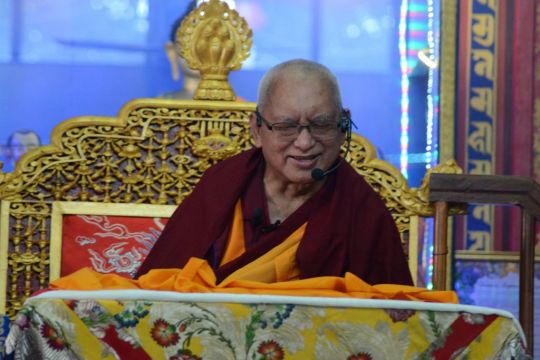
Lama Zopa Rinpoche giving a Great Chenrezig initiation, Bodhgaya, India, February 1, 2017. Photo from Root Institute for Wisdom Culture via Facebook.
Lama Zopa Rinpoche has been in Bodhgaya, India, since late December, attending the Kalachakra initiation offered by His Holiness the Dalai Lama and himself offering teachings and initiations, as well as going on pilgrimage to many of Buddhism’s holiest sites, meeting with students and other lamas, and visiting FPMT social projects: Maitreya School, Shakyamuni Buddha Clinic, and MAITRI Charitable Trust.
During the last few days of January and the first few days of February, Rinpoche gave teachings at Root Institute for Wisdom Culture and offered students a Great Chenrezig initiation and a Great Medicine Buddha initiation.
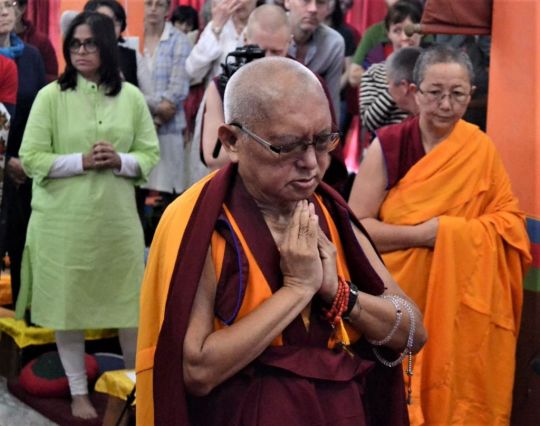
Lama Zopa Rinpoche preparing to prostrate prior to giving a Great Chenrezig initiation, Bodhgaya, India, February 1, 2017. Photo from Root Institute of Wisdom Culture via Facebook.
Rinpoche has also met with people in Bodhgaya, including His Holiness the Sakya Trizin, the supreme head of the Khon Sakya lineage and one of Rinpoche’s gurus.
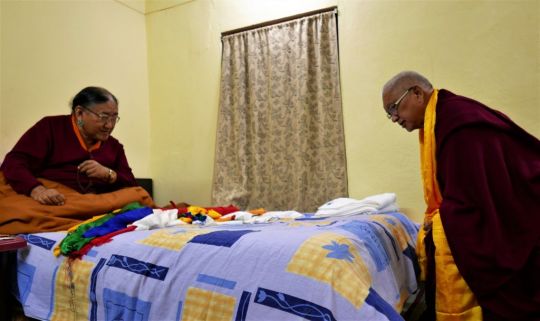
Lama Zopa Rinpoche meeting with His Holiness the Sakya Trizin, Bodhgaya, India, February 2017. Photo by Ven. Roger Kunsang.
Rinpoche also spent time with catching up with actor Richard Gere and visiting holy sites in Bodhgaya with him.
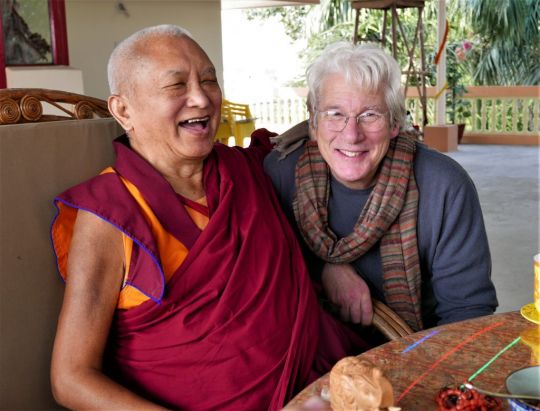
Lama Zopa Rinpoche and Richard Gere share a laugh, Bodhgaya, India, January 2017. Photo by Ven. Roger Kunsang.
Lama Zopa Rinpoche is the spiritual director of the Foundation for the Preservation of Mahayana Tradition (FPMT), a Tibetan Buddhist organization dedicated to the transmission of the Mahayana Buddhist tradition and values worldwide through teaching, meditation and community service.
1
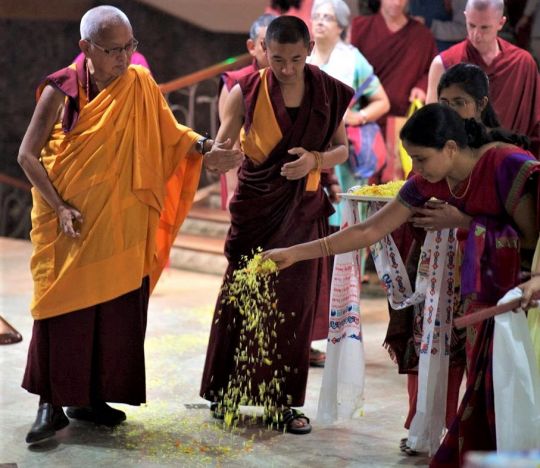
Lama Zopa Rinpoche being greeted in Bangalore, India, December 2016. Photo by Bill Kane.
Choe Khor Sum Ling (CKSL) members in Bangalore, India, are rejoicing in their recent good fortune: hosting extensive teachings by Lama Zopa Rinpoche in December 2016. About 32 FPMT Sangha and 80 lay people from around the world attended the teachings.
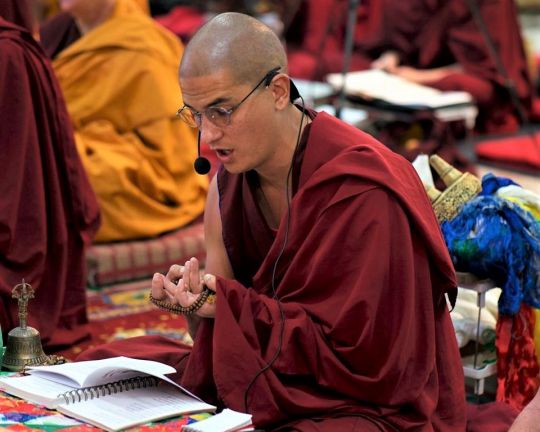
Ven. Tenzin Namjong of IMI House, Sera Je Monastery, acting as umdze (chant leader) during Rinpoche’s teachings, Bangalore, India, December 2016. Photo by Bill Kane.
Although the teachings were scheduled to be on Lama Tsongkhapa Guru Yoga, Rinpoche, seeing what would be most beneficial for the audience, taught on many of the key points of the path, including karma, the importance of motivation, the suffering nature of samsara, the Ten Innermost Jewels of the Kadampas, bodhichitta, emptiness, the importance and method of doing animal liberation practice, the meaning of the word “lama,” and how to practice the essence of guru yoga by seeing the guru as the manifestation of all the buddhas and remembering his kindness. Rinpoche also gave a White Tara long life initiation.
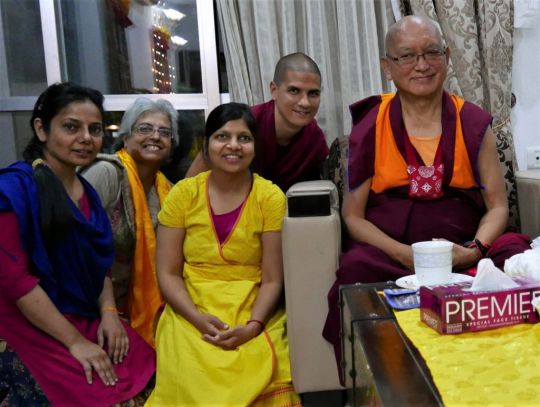
Lama Zopa Rinpoche with CKSL Center members and Ven. Tenzin Namjong, Bangalore, India, December 2016. Photo by Bill Kane.
CKSL members report on how blessed they felt on December 23, Lama Tsongkhapa Day, to be able to perform the full Lama Chöpa (Guru Puja) with tsog offering in Rinpoche’s presence. This turned into a long life puja as well when they added prayers to the Sixteen Arhats and made the traditional long life offerings to Rinpoche. In addition, for the sake of Rinpoche’s long life, Sangha and lay people attending the teachings gathered together most days and did the Sixteen Arhats puja, recited the Vajra Cutter Sutra, and recited Whita Tara and Medicine Buddha mantras.
CKSL organizers report that Rinpoche seemed pleased: the teachings were originally scheduled to be four days, but Rinpoche, through his kindness and compassion, extended them to a full ten days. He also spoke extensively about the importance of the center, giving encouragement to students to continue to do work for sentient beings and to fulfill the wishes of the guru. Rinpoche also treated the Sangha and the CKSL volunteer team to lunches and made a generous donation to CKSL’s new building project.
Rinpoche joked that although the teachings were scheduled to be on “Lama Tsongkhapa Guru Yoga,” he had only touched on the meaning of the first word, “Lama.” Rinpoche said he would try to return next year to continue. In the meantime, CKSL members expressed the hope that they could put into practice the teachings and advice they received in order to create the causes for the kind and compassionate guru to return to Bangalore to teach again and again.
The first half of Lama Zopa Rinpoche’s teachings in Bangalore can be seen on YouTube by clicking on this link: https://www.youtube.com/playlist?list=PLd3YWIA0vLx_8xqXdpEIyz-2GCVHyRi2S. The remaining teachings will also be available soon, so stay posted!
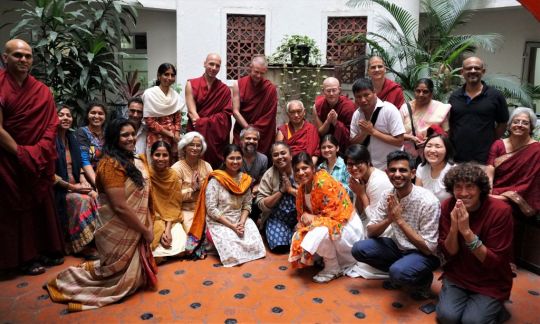
Lama Zopa Rinpoche with volunteers and staff of CKSL, Bangalore, India, December 2016. Photo by Ven. Lobsang Sherab.
With special thanks to Shanti Yajnik, Deepthy Chandrashekhar, and others at Choe Khor Sum Ling in Bangalore for reporting on this event.
Lama Zopa Rinpoche is the spiritual director of the Foundation for the Preservation of Mahayana Tradition (FPMT), a Tibetan Buddhist organization dedicated to the transmission of the Mahayana Buddhist tradition and values worldwide through teaching, meditation and community service.
- Tagged: choe khor sum ling, india, lama zopa rinpoche, teaching tours
- 0
31
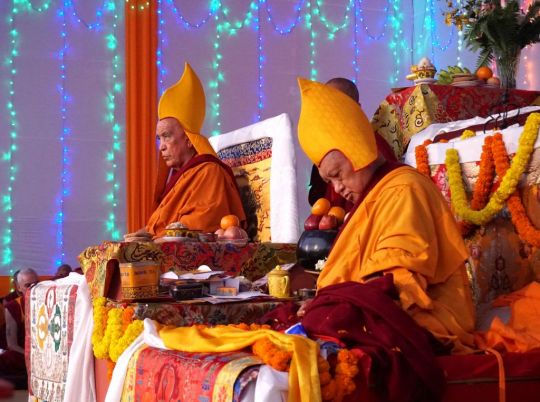
Jangtse Chöje Rinpoche and Lama Zopa Rinpoche during the long life puja offered to Lama Zopa Rinpoche in Bodhgaya on January 2, 2017. Photo by Ven. Lobsang Sherab.
A long life puja was offered to Lama Zopa Rinpoche on behalf of Sera Je Monastery on the Maitreya Project land in Bodhgaya on January 2, 2017. The puja was to thank Rinpoche for twenty-six years of support offered through the Sera Je Food Fund, which provides three vegetarian meals every day to the monks studying at Sera Je Monastery.
During the puja, the head of monastic discipline, who had been at Sera Je Monastery since before the Sera Je Food Fund was established, spontaneously praised Rinpoche for about thirty minutes, noting all the ways Rinpoche had helped the monastery. He explained what it was like at the monastery before food was regularly offered and how the monks have benefited after the fund’s creation. He said Rinpoche has cared for all the thousands of monks for the last twenty-six years like a mother does for her child.
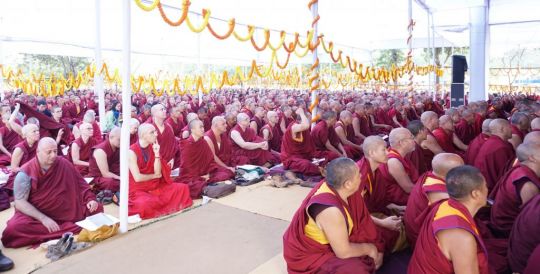
Sangha participating in the long life puja offered to Lama Zopa Rinpoche
Thousands of monks attended the puja as well as Jangtse Chöje; the new abbot of Sera Je Monastery; the past abbot of Sera Je Monastery; the past abbot of Namgyal Monastery, Jhado Rinpoche; and the past abbot of Gyurme Monastery, Khensur Geshe Tashi Tsering.
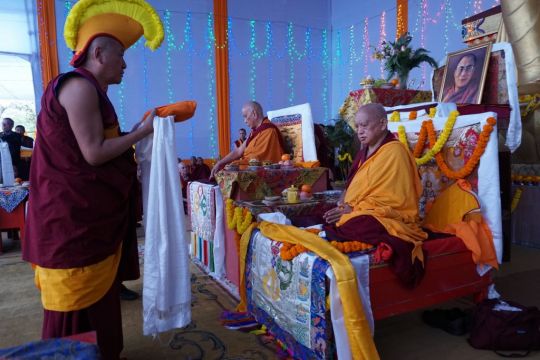
The abbot of Sera Je Monastery making offerings to Lama Zopa Rinpoche
The Sera Je Food Fund has provided millions of meals since 1991. It currently offers approximately 700,000 meals per year, 2,900 meals per day. There are, on average, 1,600 monks benefiting from the food fund.
Please rejoice in the offering of this puja for Lama Zopa Rinpoche’s long life and in Sera Je Food Fund’s twenty-six years of food offerings to the monks of Sera Je Monastery.
You can learn more about the Sera Je Food Fund, read an overview of the food offered daily, or support this project with a donation of any amount.
- Tagged: long life puja, sera je food fund, sera je monastery
- 0
30
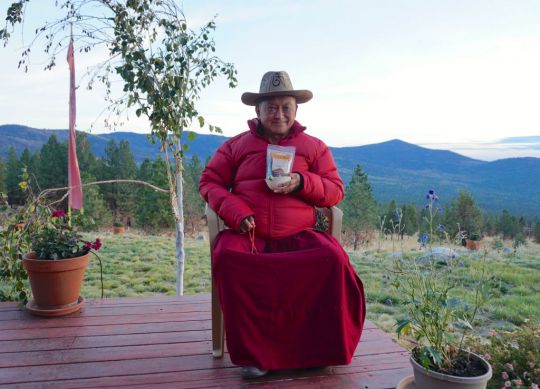
Lama Zopa Rinpoche wearing his mantra hat and holding tea offered to him by Kunsang Yeshe Retreat Centre in the Blue Mountains of Australia. Washington State, USA. November 2016. Photo by Ven. Lobsang Sherab.
Lama Zopa Rinpoche was offered tea recently by Kunsang Yeshe Retreat Centre in Australia, which was selling the tea as a fundraiser. He responded with the following advice on how to “really” bless the tea.
My most dear, most kind, most precious wish-fulfilling one,
Thank you so much for the tea you offered. I have been thinking about the tea. Many different centers only survive by donations, but in the past I did think about whether there could be a small business of selling tea that could help generate support for centers. At that time I was told that the outer packaging is also important. For example, tea packaged in the Japanese way looks very expensive. I was told that the packaging is important.
So thank you very much, I enjoyed the tea. I thought that even without milk this tea would be very good.
When I was thinking about the tea business in the past, I had the thought that I would request Khensur Denma Lochö Rinpoche, a very high Lama in Dharamsala, to bless 100 packets of tea. I thought that with Rinpoche’s prayers on the tea it could really benefit people. But Rinpoche passed away.
Anyway, regarding the tea you are producing, this is how I suggest to bless it.
It would be so good if the tea could be blessed by a group of Sangha, or can just be one or two Sangha. The first day of the blessing could be a Medicine Buddha puja at the center. It would be so good to bless the tea for one week before it is sold. That way many prayers can be done on the tea.
So to do seven days of strong prayers could have a lot of effect and bring benefit to the mind and not only the body. That would help a lot of people, especially those who drink with faith, but generally anyone who drinks it.
How to Pray:
To specifically pray to Medicine Buddha: For anyone who drinks this tea, may it help heal all depression, all those with physical sicknesses and mental sicknesses, cancer, diabetes, and curable and incurable sicknesses of the mind and body. May anybody who drinks this tea be healed immediately.
Then for anyone who drinks the tea, pray for them to be able to correctly follow the virtuous friend, to have all the realizations up to enlightenment, omniscient mind, and especially to develop loving kindness, compassion, and bodhichitta.
For anyone who drinks the tea, may it totally change their mind from harming others to cherishing and benefitting others.
So this is for the Sangha to know, how to pray and to make strong prayers. And not only Sangha but anyone who blesses the tea.
The Actual Prayers to Use:
Best would be to start with the extensive Medicine Buddha puja, this is very long and extensive so may not be possible, but you can keep in mind any time the center does do the extensive Medicine Buddha puja to bless the tea at the same time.
So if not the extensive Medicine Buddha puja, then, to start with, do the middle-length Medicine Buddha puja (this is the normal Medicine Buddha puja that is done in the centers) and make strong prayers to Medicine Buddha to bless the tea as mentioned above.
Then for the following six days you can either do the mid-length Medicine Buddha puja each day to bless the tea, OR you can do the Medicine Buddha Sadhana (that is a shorter practice, but it contains the recitation of the seven Medicine Buddha names) OR if there is only a short amount of time, then you can do the “Blessing Medicine” prayer that I have put together.
With much love and prayers,
Lama Zopa Rinpoche
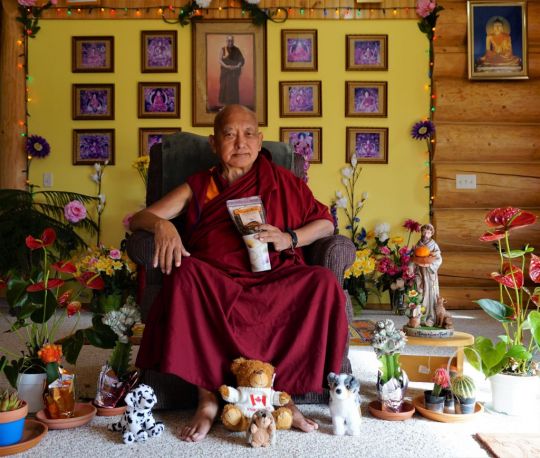
Lama Zopa Rinpoche surrounded by “friends”, holding tea offered by Kunsang Yeshe Retreat Centre in Australia. Washington State, USA, November 2016. Photo by Ven. Lobsang Sherab.
Transcribed by Ven. Holly Ansett, Buddha Amitabha Pure Land, Washington, USA, October, 2016. Edited by Mandala for inclusion on FPMT.org.
Get copies of the Medicine Buddha pujas and prayers recommended by Lama Zopa Rinpoche from the Foundation Store.
Lama Zopa Rinpoche is the spiritual director of the Foundation for the Preservation of Mahayana Tradition (FPMT), a Tibetan Buddhist organization dedicated to the transmission of the Mahayana Buddhist tradition and values worldwide through teaching, meditation and community service.
Learn more about Lama Zopa Rinpoche, spiritual director of the Foundation for the Preservation of Mahayana Tradition (FPMT), and Rinpoche’s vision for a better world. Sign up to receive news and updates.
25
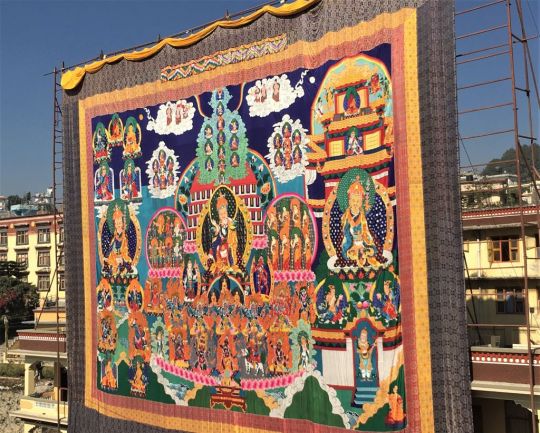
Enormous Padmasambhava thangka at Kopan Nunnery, Nepal, December 2016. Photo by Ven. Holly Ansett.
While at Kopan Monastery in Nepal in late 2016, Lama Zopa Rinpoche attended a puja at Kopan Nunnery organized by the Kopan monks and nuns, making 100,000 tsog offerings to the great Indian yogi and teacher Padmasambhava (Guru Rinpoche), who was instrumental in establishing the Dharma in Tibet.
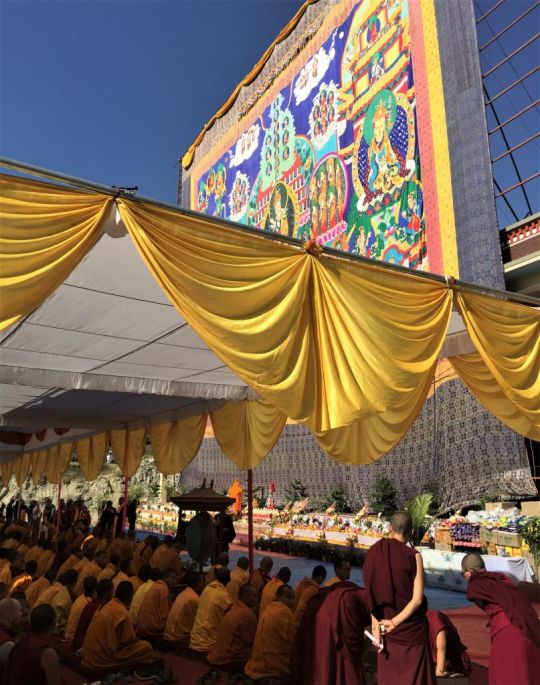
Monks and nuns perform a puja making 100,000 tsog offerings to Padmasambhava, Kopan Nunnery, Nepal, December 2016. Photo by Ven. Roger Kunsang.
The puja included the display of a gigantic Padmasambhava thangka. This thangka, made according to Lama Zopa Rinpoche’s instructions, is stitched in appliqué and is 75 feet (23 meters) high and 87 feet (27 meters) wide. Sponsored by the Lama Zopa Rinpoche Bodhichitta Fund, it took two years to create and was completed in 2013. It was then blessed by His Holiness the Dalai Lama. Lama Zopa Rinpoche attended a similar 100,000 tsog offering puja in December 2015 that was dedicated to the people of Nepal after the massive earthquake of April 2015.
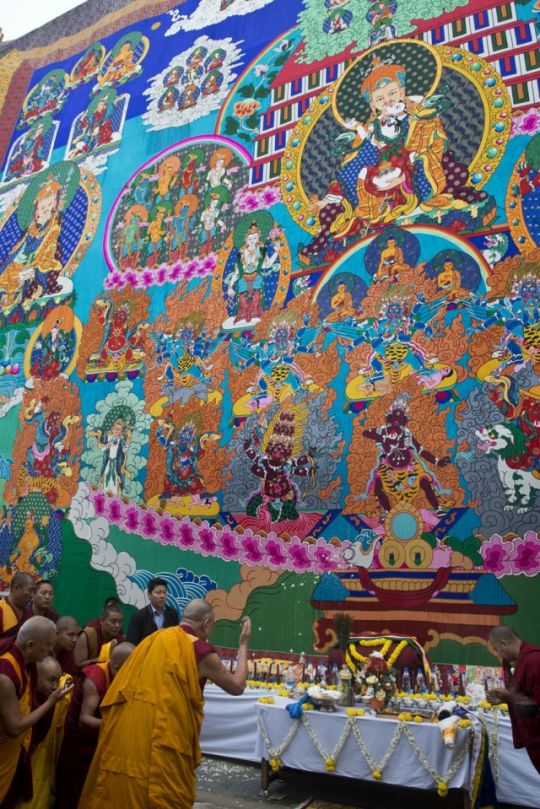
His Holiness the Dalai Lama blessing the thangka, Sera Monastery, India, December 29, 2013. Photo copyright Rio Helmi/Jangchup Lamrim Teaching Organizing Committee.
Lama Zopa Rinpoche has lauded Padmasambhava’s contributions to Buddhism and humanity: “Due to Padmasambhava’s great compassion, Tibetan Mahayana Buddhism flourished in Tibet and now has spread throughout the entire world. Because of that, so many people have experienced the path to enlightenment and achieved enlightenment. Due to his great compassion, the lives of infinite number of sentient beings have become meaningful.”
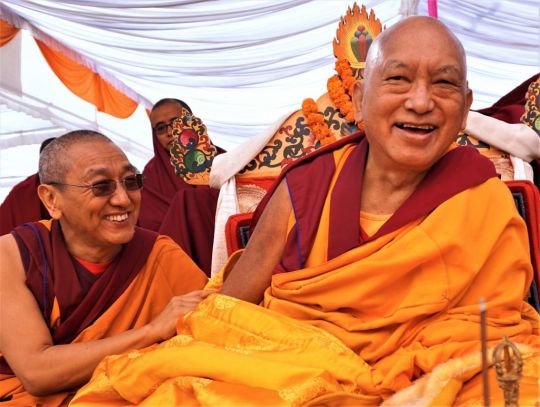
Khen Rinpoche Geshe Chonyi and Lama Zopa Rinpoche at the 100,000 tsog offerings to Guru Rinpoche puja, Kopan Nunnery, Nepal, December 2016. Photo by Ven. Lobsang Sherab.
One of Lama Zopa Rinpoche’s Vast Visions for FPMT is to create large thangkas. “My wish is for the big centers in FPMT to have these large thangkas.” Rinpoche explained. “This is a way to leave imprints for all these people [who see them], for enlightenment.”
Another of Lama Zopa Rinpoche’s Vast Visions for FPMT is to build many large statues of Padmasambhava around the world in order to create the cause for peace for all beings. The Padmasambhava Project for Peace was established to fund the creation of these statues:
https://fpmt.org/projects/fpmt/padmasambhava/
The Lama Zopa Rinpoche Bodhichitta Fund supports Rinpoche’s compassionate service to others. More information can be found at https://fpmt.org/projects/fpmt/lzrbf/.
Lama Zopa Rinpoche is the spiritual director of the Foundation for the Preservation of Mahayana Tradition (FPMT), a Tibetan Buddhist organization dedicated to the transmission of the Mahayana Buddhist tradition and values worldwide through teaching, meditation and community service.
- Tagged: guru rinpoche, khachoe ghakyil ling, kopan course 2016, lama zopa rinpoche, large thangka, padmasambhava
- 0
23
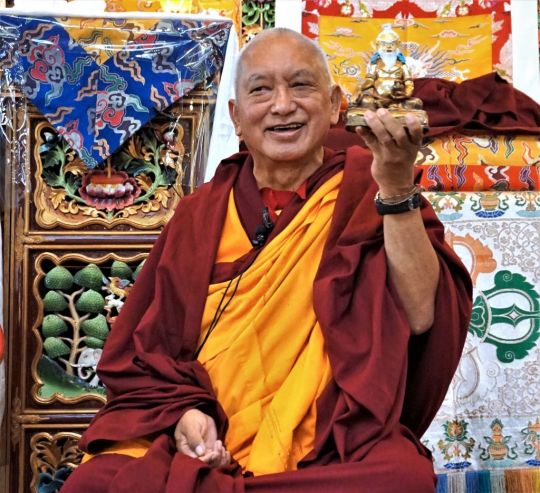
Lama Zopa Rinpoche holds up a statue of Tibetan master Thangtong Gyalpo while explaining his life story, Kopan Monastery, Nepal, December 2016. Photo by Ven. Lobsang Sherab.
While at Kopan Monastery in Nepal recently, Lama Zopa Rinpoche was shown a precious relic from the great Tibetan yogi Thangtong Gyalpo by Chusang Rinpoche, the spiritual head of Chusang Gompa, a Gelug monastery in Boudhanath, Nepal.
Chusang Rinpoche was born in Tibet in 1959 and is the son Bardok Chusang Rinpoche. The family took refuge in Nepal in the early 1960s, and the younger Rinpoche went on to become a lharampa geshe. He visited Lama Zopa Rinpoche this past December and showed him the relic, which self-emanated from a dog bone.
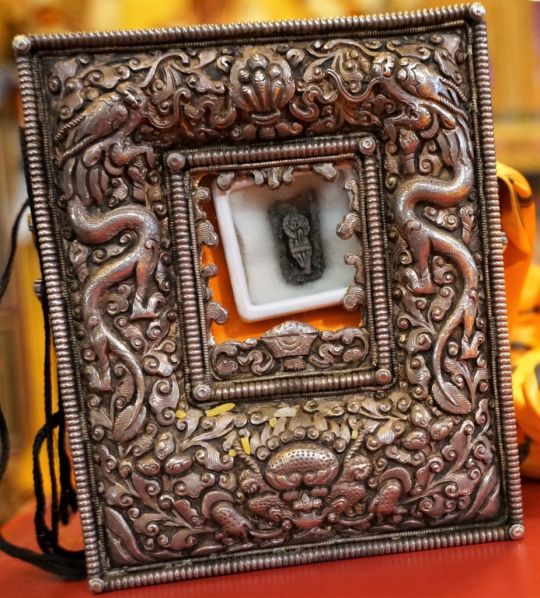
Relic from Thangtong Gyalpo, self-emanating from dog bone, Kopan Monastery, Nepal, December 2016. Photo by Ven. Lobsang Sherab.
Lama Zopa Rinpoche took the opportunity to give a talk about Thangtong Gyalpo and show students the relic.
Thangtong Gyalpo (1385–1464) was not just a great yogi but also a skilled engineer and artist, famous for building bridges across rivers to help the people of Tibet in very practical ways. He is said to have built 58 iron bridges, 60 wooden bridges, 118 ferries, 120 assembly halls and temples, 111 stupas and many hundreds of large and small statues, as well as creating innumerable paintings.
Lama Zopa Rinpoche has recommended that students of FPMT living in areas threatened by earthquakes post an image of Thangtong Gyalpo to help mitigate the effects of possible quakes.
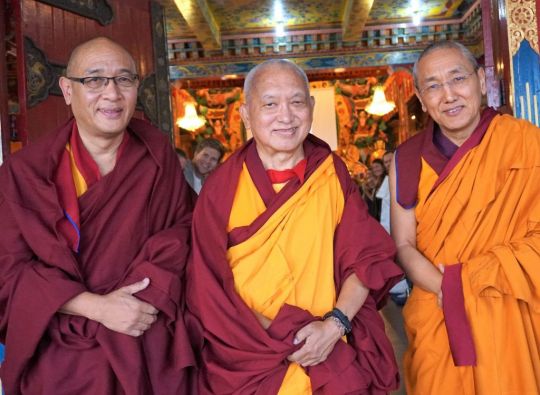
Chusang Rinpoche, Lama Zopa Rinpoche, and Khen Rinpoche Geshe Chonyi, Kopan Monastery, Nepal, December 2016. Photo by Ven. Lobsang Sherab.
For more advice from Rinpoche on earthquakes, please see the page “Tsunami and Earthquakes”:
https://fpmt.org/teachers/zopa/advice/tsunami-and-earthquakes/
Lama Zopa Rinpoche is the spiritual director of the Foundation for the Preservation of Mahayana Tradition (FPMT), a Tibetan Buddhist organization dedicated to the transmission of the Mahayana Buddhist tradition and values worldwide through teaching, meditation and community service.
18
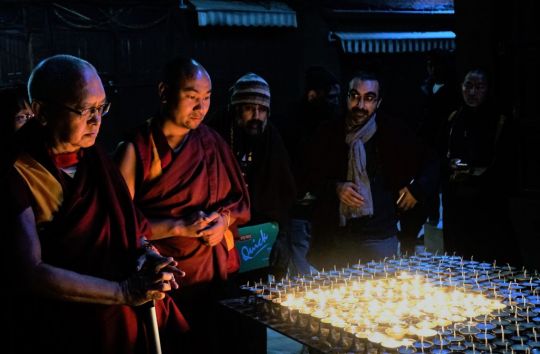
Lama Zopa Rinpoche, Boudhanath Stupa, Nepal, December, 2016. Photo by Ven. Lobsang Sherab.
“If we want to develop Dharma wisdom, then offer light.”
So said Lama Zopa Rinpoche during a teaching in Singapore in 2013. What are the results of offering lights? Rinpoche explained, “It is mentioned that if we make offerings of light or incense, do prostrations and so forth, we collect numberless great merits … By making light offerings, you are able to dispel the darkness of ignorance and achieve wisdom. By offering light, you are never in darkness while you are circling in samsara. There will always be light. And offering light just one time to Buddha creates the karma to have great wealth for many hundreds or thousands of lifetimes … [We also attain] a higher rebirth, in a pure land. We quickly achieve nirvana, and not only nirvana but also the great nirvana, enlightenment. These are the benefits of offering light.”
Rinpoche also made clear that all lights can be offered. “Many people might think if you are offering light, it should be just a butter lamp, a candle or an oil lamp. Thinking that you can’t offer the other lights in the house, for example, electric lights, is a very limited idea. Thinking that you can only offer candles is wrong. Whatever light is more clear and dispels darkness, that is the better light, so you can offer all the lights in the house.”
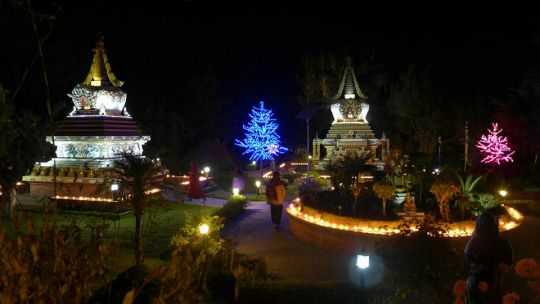
Offered lights at Kopan Monastery, Nepal, November, 2016. Photo by Laura Miller.
Read Lama Zopa Rinpoche’s teaching on light offerings in The Benefits of Making Offerings in the Lama Yeshe Wisdom Archive.
Learn more about how to make light offerings and other offerings in the book Extensive Offering Practices by Lama Zopa Rinpoche, available in The Foundation Store.
Lama Zopa Rinpoche is the spiritual director of the Foundation for the Preservation of Mahayana Tradition (FPMT), a Tibetan Buddhist organization dedicated to the transmission of the Mahayana Buddhist tradition and values worldwide through teaching, meditation and community service.
- Tagged: boudhanath stupa, lama zopa rinpoche, light offering
- 0
16
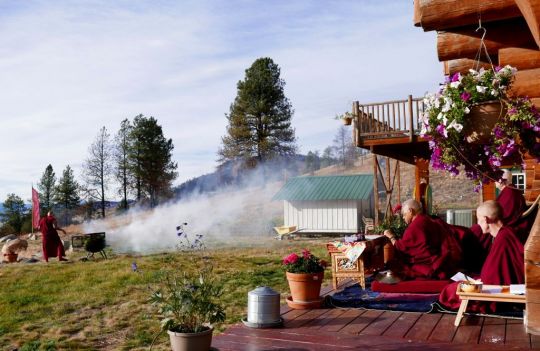
Lama Zopa Rinpoche and Sangha offering incense to benefit beings at Buddha Amitabha Pure Land, Washington State, USA, November 2016. Photo by Ven. Roger Kunsang.
How many ways are there to benefit other living beings?
At Buddha Amitabha Pure Land (BAPL) in Washington State, USA, Lama Zopa Rinpoche, resident Sangha, and visiting students take many measures to benefit the living beings—animals, insects, snakes, birds, and fish—who share the land and water there.
Rinpoche is always thinking of new ways to spread blessings, take away suffering, and help even the smallest creatures. These include the recitation of mantras, sutras, and prayers, as well as other activities. Many of these are described by Ven. Tharchin, a resident of BAPL, in a 25-minute YouTube video on FPMT’s YouTube channel (see below).
According to Rinpoche in his book Liberating Animals from the Danger of Death, sentient beings can experience purification of their karma and avoid the lower realms in the future as a result of such practices. Rinpoche says: “When the Buddha gave teachings to 500 swans in a field, in their next life they were born as human beings. They became monks and all became arya beings, able to achieve the cessation of suffering and the true path. So the result is unbelievable, just by hearing Dharma words.”
Watch Ven. Tharchin, a resident of Buddha Amitabha Pure Land, explain the many measures that are taken there to benefit living beings:
https://youtu.be/aqORZkZoAqQ
Benefiting animals is one of Lama Zopa Rinpoche’s Vast Visions for FPMT:
https://fpmt.org/fpmt/vast-vision/#animals
For more about FPMT’s activities to benefit animals see:
https://fpmt.org/tag/animals/
Get Liberating Animals from the Danger of Death as an e-book or in a print copy from the Foundation Store and support FPMT International Office:
https://shop.fpmt.org/Liberating-Animals-eBook_p_2334.html.
Lama Zopa Rinpoche is the spiritual director of the Foundation for the Preservation of Mahayana Tradition (FPMT), a Tibetan Buddhist organization dedicated to the transmission of the Mahayana Buddhist tradition and values worldwide through teaching, meditation and community service.
11

Lama Zopa Rinpoche pours blessed water into the Atlantic Ocean off New York, USA, August 2016. Ven. Sangpo is holding a laminated Namgyalma mantra in his hand in preparation for putting it into the ocean. Photo by Ven. Lobsang Sherab.
When Lama Zopa Rinpoche was in New York this past summer, he took the time to go out onto the Atlantic to bless the ocean. A kind friend offered his boat for a ride, and amid rough waves, Rinpoche and a few supporters took to the water. While some on the boat got seasick, Rinpoche did not.
Rinpoche poured blessed water from a Guru Rinpoche holy place in Bhutan into the ocean and held a mantra wheel filled with mantras on microfilm out over the ocean to help purify the negative karma of beings living in the water. As well, Namgyalma mantras were placed on the surface; some floated and some sank. The Namgyalma mantras had been prepared under Rinpoche’s instructions, and each has mantras in Tibetan on one side, while the other side has a description in English of what the mantras are so that anyone finding them does not throw them away. They are laminated in plastic to withstand the water. Once in the ocean, the mantras continually bless all the living beings that come into contact with the water.

One of the Namgyalma mantras floating on the Atlantic ocean off New York, August 2016
What are the benefits of the Namgyalma mantra? Says Lama Zopa Rinpoche: “There are unbelievable, unbelievable benefits to this mantra.” He explains, “Namgyalma is a deity for long life and purification. The mantra has infinite benefits; it is so powerful. It is said that for anyone who hears this mantra, this will be the last time that person is born in the womb. If animals hear it, they will not be reborn in the lower realms ….” Wind or water that touch the mantra, he says, will bless and purify sentient beings.
Watch Lama Zopa Rinpoche describe the motivation for blessing beings in the ocean and the ways of blessing them on YouTube:
https://youtu.be/vex–9nBBBY
Read more about Lama Zopa Rinpoche blessing living beings around the world with the Namgyalma mantra:
https://fpmt.org/tag/namgyalma-mantra/
Watch a short video about the benefits of the Namgyalma mantra:
https://fpmt.org/mandala-today/the-benefits-of-the-namgyalma-mantra-video/
Or, read an article about the benefits of the Namgyalma mantra:
https://fpmt.org/mandala/archives/mandala-issues-for-2008/august/the-benefits-of-namgyalma-mantra/
For more about FPMT’s activities to benefit animals see:
https://fpmt.org/tag/animals/
Get Liberating Animals from the Danger of Death as an e-book or in a print copy from the Foundation Store and support FPMT International Office:
https://shop.fpmt.org/Liberating-Animals-eBook_p_2334.html.
Lama Zopa Rinpoche is the spiritual director of the Foundation for the Preservation of Mahayana Tradition (FPMT), a Tibetan Buddhist organization dedicated to the transmission of the Mahayana Buddhist tradition and values worldwide through teaching, meditation and community service.
- Tagged: animals, lama zopa rinpoche, namgyalma mantra
- 0
9
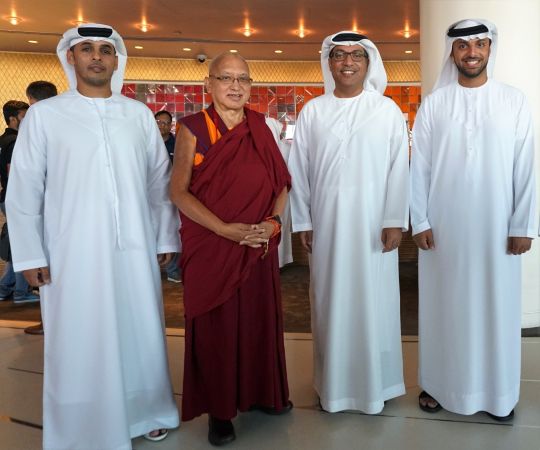
Lama Zopa Rinpoche meets some new friends in Abu Dhabi, United Arab Emirates, on his way to Nepal, November 2016. Photo by Ven. Lobsang Sherab.
“[It would be good] for the centers to arrange regular interfaith dialogues with religious leaders in their local community,” encouraged Lama Zopa Rinpoche when he developed his Vast Visions for FPMT, noting that this is one way FPMT can offer service to His Holiness the Dalai Lama and support his aims.
On the subject of other religions, Rinpoche wrote in a letter to a student in 2013, “As His Holiness the Dalai Lama says, all religions that have conduct and views as their main instruction are telling people to have a good heart and love and compassion for the living beings. That is the main focus, and it is the same for many religions. So the conclusion is the same, to generate loving kindness and compassion to others, to not harm and to benefit others. It’s the same in Buddhism and the other major religions … I want to say the most important thing is to develop compassion for all living beings.”
Elsewhere, Rinpoche has explained, “There are many religions in the world, such as Christianity, Hinduism, Islam, and so forth. These different religions are needed. It’s like having different clothes or different kinds of food in a restaurant; we need variety for different people. Christianity is needed for people who have the karma to devote themselves to Christianity and Hinduism is needed for those who have the karma to devote themselves to Hinduism and so forth. We must respect other religions … because many people in the world need Christianity and the other religions for their happiness. Therefore we must respect that.”
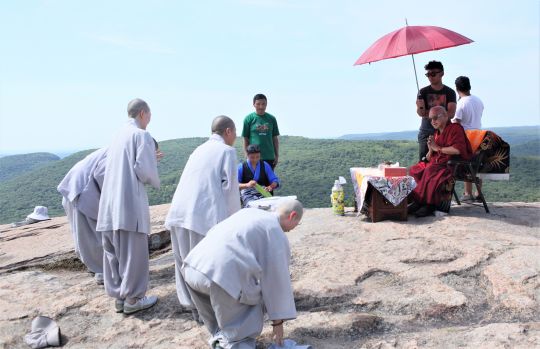
Lama Zopa Rinpoche greets Korean Sangha in New York, USA, July 2016. Photo by Ven. Lobsang Sherab.
While we need to have deep respect for all religions, Buddhism—since we have the karma for it—is still tremendously precious. On the subject of Buddhist practice, Lama Zopa Rinpoche explained in 2012, “From the three principal aspects of the path to enlightenment we can realize all the paths of Buddhism. We can achieve not only temporary happiness but also the happiness of future lives and ultimate happiness: liberation from samsara and full enlightenment. We are so lucky that we have met these teachings.”
Read more about Lama Zopa Rinpoche’s vast visions for FPMT at:
https://fpmt.org/fpmt/vast-vision/
Lama Zopa Rinpoche is the spiritual director of the Foundation for the Preservation of Mahayana Tradition (FPMT), a Tibetan Buddhist organization dedicated to the transmission of the Mahayana Buddhist tradition and values worldwide through teaching, meditation and community service.
- Tagged: interfaith, Islam, lama zopa rinpoche
- 0
4
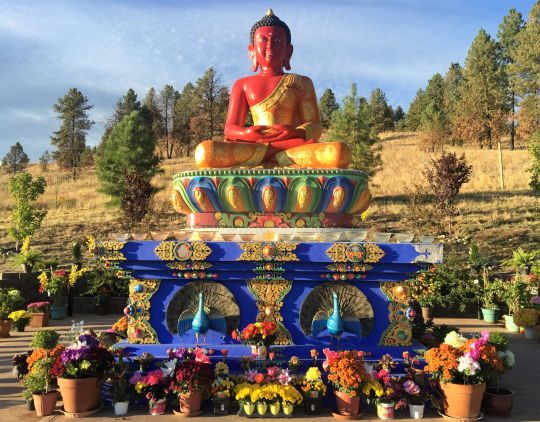
Amitabha Buddha Statue with flower offerings, Buddha Amitabha Pure Land, Washington State, USA, October 2016
A student wrote to Lama Zopa Rinpoche in October 2016 to ask what to do when finding dead insects. Rinpoche responded from Buddha Amitabha Pure Land in Washington State, taking the opportunity not only to give advice but to describe in detail how he and Sangha members work to benefit insects, birds, and other small animals there.
My most dear, most kind, most precious wish-fulfilling one,
Thank you for your kind email. With respect to dead insects, the main thing you can do to benefit them is to recite the mantra of Compassion Buddha (OM MANI PADME HUM), Stainless Pinnacle mantra, Stainless Lotus Pinnacle mantra, the short Namgyalma mantra, and the Five Powerful Deities mantras.
After reciting a few times—or it can be fifteen times, twenty times, or one mala of each mantra, whatever you can—blow over the dead body of the insect to purify its negative karma and obscurations collected since beginningless rebirths. Then, visualize that it generates into the deity of the mantra you recited.
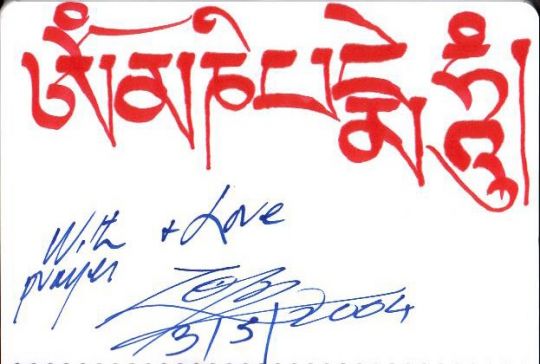
OM MANI PADME HUM, the mantra of the Buddha of Compassion, written by Lama Zopa Rinpoche in 2004
Of course to begin with, first generate a bodhichitta motivation to free numberless sentient beings from the oceans of samsaric suffering and to bring them to full enlightenment, especially these insects, these dead animals, who are my mother sentient beings, from whom I have received all my happiness, and not only today’s happiness, but next life’s happiness and ultimate happiness—enlightenment. It is received from each of them and they have all been my mother and kind to me since beginningless time.
After the mantra recitation and blowing on the insects and visualizing them as the deity, then dedicate: “Due to all the merit created in the three times by me, by sentient beings and numberless buddhas, may bodhichitta be generated in the hearts of all the six realm sentient beings, then the sentient beings in this world, particularly the students of FPMT and benefactors. May everyone who sees me, touches me, remembers me, thinks about me, talks to me, hears my voice, sees me or my photo, dreams of me, helps me or harms me, dislikes me or likes me, praises me or criticizes me, including my friends and family, never ever be reborn in the lower realms. May they be reborn in a pure land, where they will be enlightened or receive a perfect human body, meet the Mahayana teachings, and meet a perfectly qualified Mahayana guru who reveals the unmistaken path to enlightenment. And, by pleasing the holy mind of the virtuous friend, may they achieve enlightenment as quickly as possible.
“Due to all the merit created in the three times by me, by sentient beings and numberless buddhas, may each animal or insect be reborn in a pure land where it can be enlightened, or at least have a perfect human rebirth and meet the pure Mahayana teachings and a perfect guru who reveals the unmistaken path to enlightenment. And, by pleasing most the holy mind of the guru, may it achieve enlightenment as quickly as possible.
“Due to all the merit created in the three times by me, by sentient beings and numberless buddhas, who do not exist from their own side, may the I, which does not exist from its own side, achieve buddhahood—peerless happiness, which does not exist from its own side, which is empty—and then lead all sentient beings, who do not exist from their own side, to that buddhahood, which does not exist from its own side, by myself alone, who does not exist from its own side.”
For any prayer, sadhana, or mantras that you do in your daily life, as commitments or practices, you can keep a bottle of water next to you. After each recitation, blow into the bottle of water. When you see a living or dead insect or animal, you can sprinkle the blessed water on it. A monk in Washington has been doing this every day. When he does his prayers, after each mala of mantras, he blows in a bottle of water and mixes this water with tsampa (roasted flour), sugar, butter, and blessed pills (mani pills) from His Holiness the Dalai Lama, which are crushed very well. All this is mixed as a dry fine powder. Then, he goes to about twenty different ants’ nests around the retreat land and he does the practice of charity to ants by sprinkling this mixture on the ants’ nests while reciting mantras, in this way benefiting the ants. After one week all the tsampa has been eaten by the ants. This practice started a few years ago when I found two ants’ nests on the retreat land in Washington and I did this practice for them. Now it is being done every week.
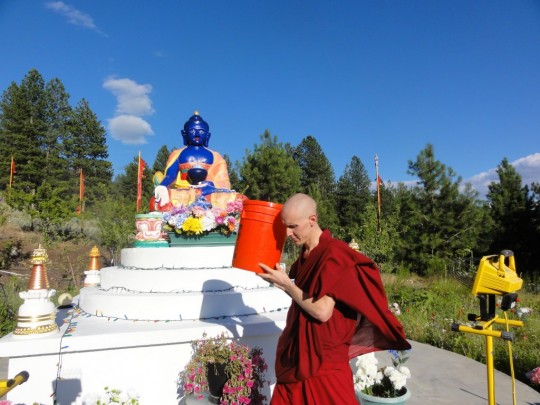
During animal liberation practice, animals, like worms, are carried around holy objects to help them create merit, Buddha Amitabha Pure Land, Washington State, US, 2015
In addition to this, every week worms are bought. These are worms that otherwise would be used as bait for fishing. The mantra water is also sprinkled on them and then they are taken around many holy objects, mantras are recited, and then they are released into the garden. Each week about 1,300 worms are liberated like this. [Read about the Animal Liberation Fund.]
In the past we collected all the dead insects around the house, dead moths and bugs, and we even asked the neighbors to also collect all their dead insects and to give them to us. We put all the dead insects on a cloth above a bucket and then poured the mantra water over the insects (so they would stay on the cloth as the water drained through it, blessing their bodies). Also, we would recite different mantras: the Compassion Buddha mantra (OM MANI PADME HUM), the Stainless Pinnacle mantra, the Stainless Lotus Pinnacle mantra, the short Namgyalma mantra, and the Five Powerful Deities mantras. You can do the Vajrayogini mantra if you are practicing that. Normally, it is the Five Powerful Deity mantras—these mantras are extremely powerful—and also the Mitrugpa mantra. However, the main one is Compassion Buddha mantra, the mantra of Chenrezig.
So, do the purification like that. You can collect the dead animals and when you have quite a lot collected, you can do this, blessing them with the mantra water that you have already created from the mantras that you recite every day. As you pour, the water purifies all their negative karmas collected from beginningless rebirths. At the end, think that they are purified and all become the deity. After that you can put the blessed dead insects in the ocean or river, but you can’t throw them in the garbage after you have visualized them as the deity. Or, you can put them in the nighttime soup! I’m joking.
Any insects we find in the house, dead or alive, we use the animal liberation catchers to pick them up. As the insect goes inside the little box, because there are Namgyalma mantras on the tops, as the insect goes under that, however long they are there, they are always getting purified. On each of the small boxes are mantras that bless the insect while it is inside and also words, what to think and what the animals are saying, etc. The box also has other mantras on it so that when the insect goes under these mantras, 100,000 eons of negative karma are purified.
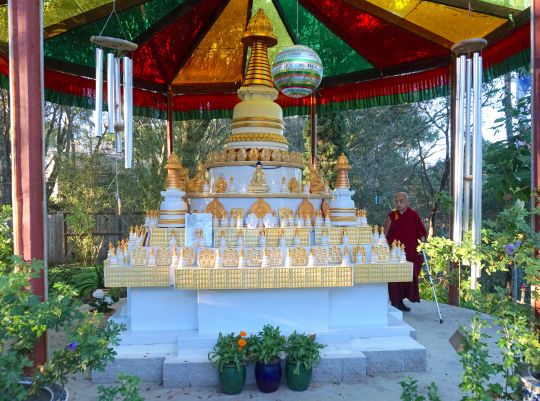
Lama Zopa Rinpoche circumambulating the stupa at Kachoe Dechen Ling, Aptos, California, November, 2016. Photo by Ven. Lobsang Sherab.
If an insect is still alive in the container, you can also take it around a stupa. Stupas have the Four Dharmakaya Relic mantras. Usually they are written on gold on the life tree, as well as rolled around it. The stupas in FPMT have many, many of the Four Dharmakaya Relic mantras inside.
If a stupa has even just one copy of the Four Dharmakaya Relic mantras in it, or even just a single mantra, every atom of the stupa has great power, and insects that land on the stupa will be purified. If they even brush against the stupa, their negative karma will be purified. When rain comes down and touches the stupa, if that rain touches any insect on the ground or anywhere else, it purifies the insects. Even wind that has touched the stupa blesses any living being that it touches. After wind has touched the stupa, any human being or animal touched by that wind is purified. And any dust that touches the stupa purifies human beings or animals who touch it.
There are incredible benefits of the Four Dharmakaya Relic mantras [read The Four Dharmakaya Relic Mantras and Their Benefits]. One of the mantras is the Secret Relic mantra. Even if there is only one of these mantras in a stupa, if you go around that stupa just one time, it purifies all your negative karma completely, even the heavy negative karma to be reborn in the eight hot hells, which are 1) Being Alive Again and Again, 2) Black Line, 3) Gathered and Crushed, 4) Crying, 5) Great Crying, 6) Hot, 7) Extremely Hot, and then 8) the Unbearable Inexhaustible Hot Hell, where if you are born there, it is for one intermediate eon. Even if this world becomes empty, but your karma is not finished, you are reborn in other universes’ inexhaustible hell realms. This continues until your karma finishes.
But by going around the stupa one time, it completely purifies all that, and you don’t have to be reborn in the eight hot hell realms. Not only that, your life continually, without break, will go toward enlightenment. And not returning to the lower realms also will help you to be born in a pure land.
There are so many incredible, unbelievable, unbelievable benefits, just from this one mantra. Here I am just talking about the essence of just one mantra, but there is also one mantra called Ornaments of Enlightenment. If you put even one of those mantras inside a stupa, you collect the same merit as having built 100,000 stupas. This is just the very basic essence of this mantra’s benefits, which are so vast. This mantra also purifies the negative karma of having killed one’s father or mother, killed an arhat, caused blood to flow from a buddha, or created disunity among the Sangha: those very heavy negative karmas that, if you have created them, you will have to experience the karma without a break. All these negative karmas get purified.
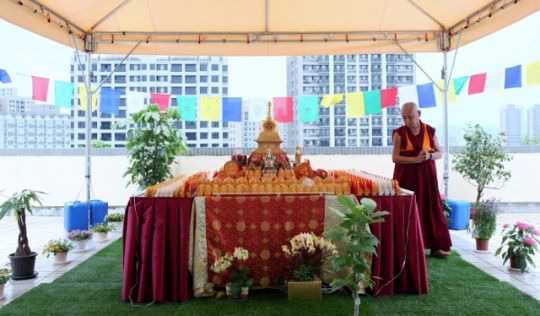
Lama Zopa Rinpoche circumambulates rooftop veranda altar, Taiwan, May 2016. Photo by Ven. Lobsang Sherab.
It is so, so, so unbelievable, the karma of circumambulating a stupa or statue that has the Four Dharmakaya Relic mantras inside. These are just some of the benefits of some of the mantras, but there are far more benefits that also come from other mantras: the Stainless Lotus Pinnacle mantra, Stainless Pinnacle mantra, Stainless Beam mantra, and the Ornament of Enlightenment mantra. One of the benefits of the Ornament of Enlightenment mantra is that by putting this mantra inside a stupa, you get the same merit as having built 100,000 stupas.
These are the unbelievable, unbelievable benefits that you are giving to animals and insects by taking them around a stupa that has the Four Dharmakaya Relic mantras inside. And, along the way, you also get unbelievable benefits!
If you have a stupa in your home, when guests come over to visit you, you can also take them around the stupa, if that is practical. Or if you offer them a drink, as you do so you can carry the drink around the stupa. They will follow you and in this way circumambulate. Or, while you are conversing, you can be walking around the stupa. This is a way to create an opportunity for those who don’t believe in stupas to circumambulate them.
Of course, as I have already mentioned, any live insects you find in the house, you can put in a container and take around the stupa, like ants, bugs, moths, etc. And however many holy objects that are in the stupa, for example, if there are one billion holy objects in it, then if you have a bag with 1,000 crickets in it (sometimes you can get this from a pet store as they feed these to other animals), by taking the bag around the stupa, you help to create the cause of enlightenment one billion times.
So I just wanted to mention some ways you can help sentient beings. There are so many ways and it is so incredibly enjoyable. If you can, from time to time buy bait worms from the market. Buy whatever you can get, even two or three boxes, and then take them around a stupa, bless them with mantra water, and then release them in your garden.
Here in Washington, since we have to go to the shops regularly, I thought that each time we went shopping we could buy a box of worms. Then I could take them around our altars that have so many tsa-tsas, texts, statues, etc. Last time we went shopping, I did this. I bought ten boxes and I carried them around the holy objects, and then the monks here took them around as well.
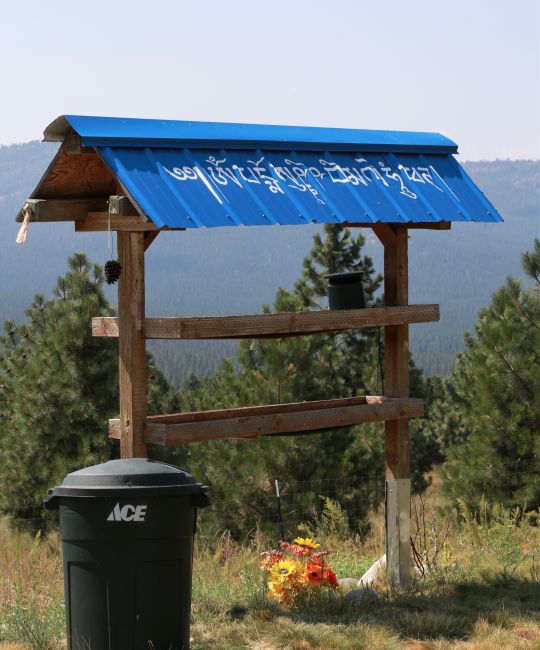
Bird feeder at Buddha Amitabha Pure Land with mantra painted on its roof to bless all the birds who go under it to eat, Washington State, 2014. Photo by Ven. Kunsang.
I also wanted to mention some other ways we are trying to help the animals in Washington, just to give you an idea. Here in Washington we have a birdbath. One of the monks here puts water in it that has been blessed by the Padmasambhava mantra. By drinking that water, birds create the cause to achieve enlightenment in one lifetime. It is a very blessed mantra. We do this by putting the mantra that is on glass inside a jug of water, then that water is poured from the jug into the birdbath. We don’t put the mantra inside the birdbath so that the birds don’t sit on top of it and create negative karma; instead, we put the mantra in a jug, fill it with water, and pour from the jug. In addition, we add water that has already been blessed by mantras as I mentioned above. In this way, when the birds drink or bathe, the water benefits them and helps them to quickly achieve enlightenment.
In addition to the blessed water, the monk adds to the birdbath very finely powdered mani pills that have been blessed by His Holiness the Dalai Lama and thousands of monks. These pills are crushed and mixed with the water for the birds. In addition, we have a speaker by the birdbath and bird feeder. The speaker plays 24 hours a day the Golden Light Sutra, Sanghata Sutra, and Vajra Cutter Sutra, as well as different mantras, so that when the birds come, they hear these being recited and this purifies their minds and plants the seeds of enlightenment.
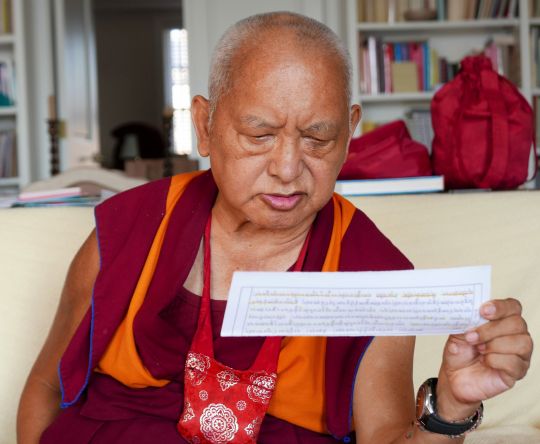
Lama Zopa Rinpoche reciting the Aryasanghata Sutra, New York, USA, 2016. Photo by Ven. Roger Kunsang.
Actually, the birds and animals who get to hear these sutras are more fortunate than even billionaires and millionaires in this world who do not have the fortune to hear these sutras. When the birds drink the water, they are so fortunate, because it purifies them in many ways. This not only stops their thirst, it purifies the minds and negative karma of all those who bathe in the water or eat the seeds in the bird feeder. It purifies so much negative karma. So even the water given to the birds benefits them. On the bird feeder we have put mantras on the roof: the Namgyalma mantra and also the mantras that by seeing and by going under them 100,000 eons of negative karma are purified. Also, they hear the recitation of the sutras and powerful mantras day and night while they eat the seeds. In addition, feeding the birds stops them from having to eat insects and create negative karma that way. [Read “How to Benefit the Bodies and Minds of Birds [Video].”]
The other day we went to a large lake and put in the same Padmasambhava mantra. We had it printed on tin and we stuck the tin mantra on plastic so we could place it standing up on the side of the lake in the water, so that animals don’t swim over the top and also so that the mantra is not on the bottom of the lake. We also put Namgyalma mantras into the water. They are laminated and then put inside hard plastic, so they float and are kept dry and the mantra protected. The mantra floats, so we put a few on the surface of the lake. Unless people find them and throw them away, they should bring benefit for a long time. Having the Namgyalma mantra in the water blesses all the fish and other sentient beings. It purifies their negative karma and if they die, they get born in a higher realm and hopefully they meet the Dharma. We are hoping to put more of these mantras in different lakes in the surrounding area. [Read “Lama Zopa Rinpoche Blesses Lake-Bound Beings.”]
So these practices are different ways you can benefit sentient beings, including insects. This is what makes your life most beneficial, most happy, most meaningful, not only for you but for all sentient beings.
Thank you very, very much for your kindness. So your whole life, up to enlightenment, benefits by relying on Chenrezig and pleasing Chenrezig, this is so important, it’s very good. Thank you.
Of course, as you must do everything, please do whatever you do with strong bodhichitta. Recite each and every mantra for every sentient being, for ALL sentient beings, to purify them from the oceans of suffering and to bring them to Chenrezig’s enlightenment quickly.
With much love and prayers,
Lama Zopa
Transcribed by Ven. Holly Ansett. Edited by Mandala for publication on FPMT.org.
Watch on YouTube as Ven. Tharchin explains one way residents at Buddha Amitabha Pure Land try to prevent harm to living beings, in this case by protecting the ants that cross the road:
https://youtu.be/ZAMwkAQSDlI
To learn more about some of the mantras Lama Zopa Rinpoche mentions, please read Essential Mantras for Holy Objects, available as a PDF:
https://fpmt.org/wp- content/uploads/teachers/zopa/advice/pdf/essentialmantrasholyobjectsbkltjune07lttr.pdf
Read about the benefits of the mantra of the Buddha of Compassion, OM MANI PADME HUM:
https://fpmt.org/education/teachings/lama-zopa-rinpoche/the-benefits-of-chanting-om-mani-padme-hum/
Read more about FPMT’s activities to benefit animals at:
https://fpmt.org/tag/animals/.
Get Liberating Animals from the Danger of Death as an e-book or in a print copy from the Foundation Store and support FPMT International Office:
https://shop.fpmt.org/Liberating-Animals-eBook_p_2334.html.
Lama Zopa Rinpoche is the spiritual director of the Foundation for the Preservation of Mahayana Tradition (FPMT), a Tibetan Buddhist organization dedicated to the transmission of the Mahayana Buddhist tradition and values worldwide through teaching, meditation, and community service.
- Tagged: advice from lama zopa rinpoche, animals, mantras, video, video short
- 0
2
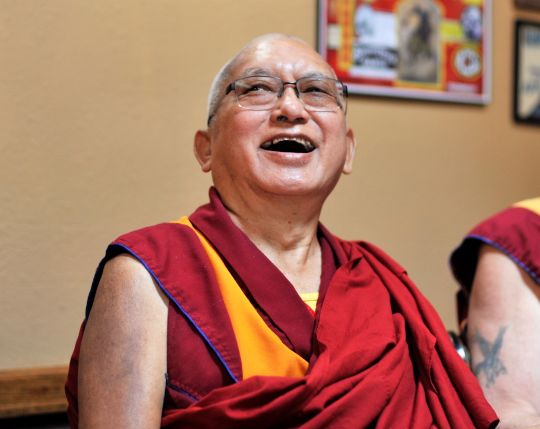
Lama Zopa Rinoche enjoying himself at a restaurant, Washington State, USA, September 2016. Photo by Ven. Lobsang Sherab.
Should we be happy?
In a letter to a student, Lama Zopa Rinpoche once wrote,” I think the most important thing is that you’re happy … I’m talking about the happiness that you can develop from life to life, up to enlightenment. This happiness can be completed; it is so meaningful. Whatever you do in the world, this is the essence. This happiness is Dharma.”
In his book The Heart of the Path: Seeing the Guru as Buddha, Lama Zopa Rinpoche explains one reason to be happy: that we have genuine teachers to guide us. “Even though we may not recognize it, all our happiness comes from our gurus. Every single good thing—past, present, and future—comes from our gurus. There is no doubt that the more we learn and practice Dharma, the more we develop our compassion and our wisdom and the more we are able to benefit other sentient beings. We are able to bring deeper and deeper benefit to others. All this comes from the kindness of the guru.”
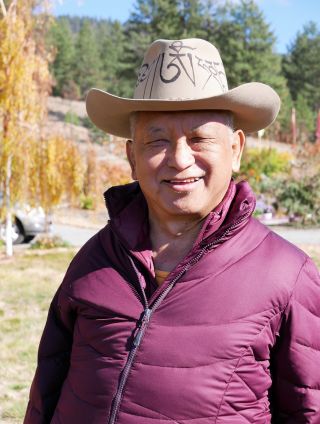
Lama Zopa Rinpoche wearing his mantra hat and joking with Sangha at Buddha Amitabha Pure Land, Washington State, USA, November 2016. Photo by Ven. Roger Kunsang.
He adds, “In this life, we can not only achieve any happiness we want—the happiness of future lives, liberation from samsara, and enlightenment—but we can achieve all of these three great meanings in each second. For example, if even without bodhichitta motivation we circumambulate or make offerings or prostrate to a statue, stupa, or scripture of Buddha, just through the power of the holy object we create the cause of enlightenment and, by the way, liberation from samsara and all the happiness of future lives. All this comes about through the kindness of the guru.”
“Without our gurus,” Rinpoche concludes, “there is no way that we could even leave an imprint on our mind by hearing the words of Dharma let alone meditate on the path to enlightenment or attain realizations. Not everyone has this chance—in fact, only a very small number do … Even though we might not now be able to attain realizations, sooner or later, because of the imprints, we will be able to have complete understanding of the words and their meaning and be able to actualize the path. Through this, we will then achieve enlightenment.” Isn’t that a reason to be happy?
A happy new year of joy and rejoicing to all!
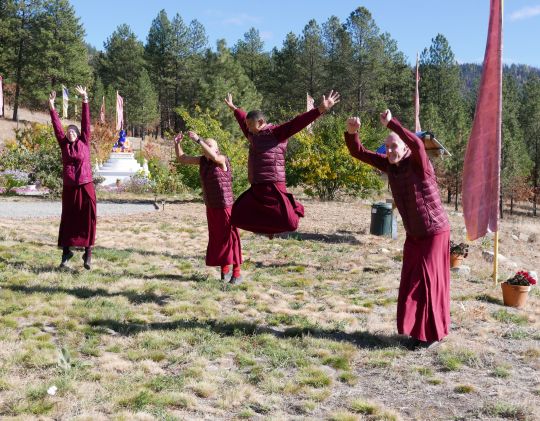
Sangha jumping for joy at Buddha Amitabha Pure Land, Washington State, USA, November 2016. Photo by Ven. Roger Kunsang.
Get the e-book or a print copy of The Heart of the Path: Seeing the Guru as Buddha from the Foundation Store and support FPMT International Office:
https://shop.fpmt.org/Heart-of-the-Path-eBook_p_2360.html
Lama Zopa Rinpoche is the spiritual director of the Foundation for the Preservation of Mahayana Tradition (FPMT), a Tibetan Buddhist organization dedicated to the transmission of the Mahayana Buddhist tradition and values worldwide through teaching, meditation and community service.
- Tagged: guru devotion, lama zopa rinpoche, rejoicing
- 0
- Home
- News/Media
- Study & Practice
- About FPMT Education Services
- Latest News
- Programs
- New to Buddhism?
- Buddhist Mind Science: Activating Your Potential
- Heart Advice for Death and Dying
- Discovering Buddhism
- Living in the Path
- Exploring Buddhism
- FPMT Basic Program
- FPMT Masters Program
- FPMT In-Depth Meditation Training
- Maitripa College
- Lotsawa Rinchen Zangpo Translator Program
- Universal Education for Compassion & Wisdom
- Online Learning Center
- Prayers & Practice Materials
- Overview of Prayers & Practices
- Full Catalogue of Prayers & Practice Materials
- Explore Popular Topics
- Benefiting Animals
- Chenrezig Resources
- Death & Dying Resources
- Lama Chopa (Guru Puja)
- Lama Zopa Rinpoche: Compendium of Precious Instructions
- Lama Zopa Rinpoche: Life Practice Advice
- Lama Zopa Rinpoche Practice Series
- Lamrim Resources
- Mantras
- Prayer Book Updates
- Purification Practices
- Sutras
- Thought Transformation (Lojong)
- Audio Materials
- Dharma Dates – Tibetan Calendar
- Translation Services
- Publishing Services
- Teachings and Advice
- Find Teachings and Advice
- Lama Zopa Rinpoche Advice Page
- Lama Zopa Rinpoche: Compendium of Precious Instructions
- Lama Zopa Rinpoche Video Teachings
- ༧སྐྱབས་རྗེ་བཟོད་པ་རིན་པོ་ཆེ་མཆོག་ནས་སྩལ་བའི་བཀའ་སློབ་བརྙན་འཕྲིན།
- Podcasts
- Lama Yeshe Wisdom Archive
- Buddhism FAQ
- Dharma for Young People
- Resources on Holy Objects
- Ways to Offer Support
- Centers
- Affiliates Area
- Teachers
- Projects
- Charitable Projects
- Make a Donation
- Applying for Grants
- News about Projects
- Other Projects within FPMT
- Support International Office
- Projects Photo Galleries
- Give Where Most Needed
- FPMT
- Shop
Translate*
*powered by Google TranslateTranslation of pages on fpmt.org is performed by Google Translate, a third party service which FPMT has no control over. The service provides automated computer translations that are only an approximation of the websites' original content. The translations should not be considered exact and only used as a rough guide.In my mind, one of the beauties of Buddhism is that it offers us a practical training for our mind. It does not say, ‘Bodhicitta is fantastic because Buddha said so!’ Instead, it gives us the methods for developing such an attitude and we can then see for ourselves whether it works or not, whether it is fantastic or not.







